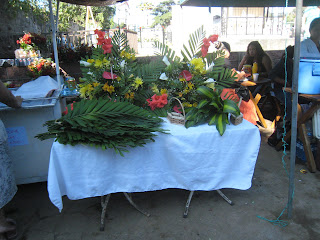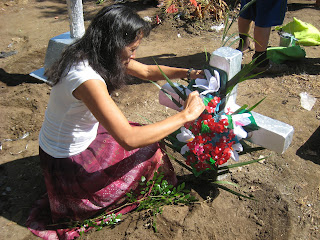Back when I was trying to figure out how long to stay in El Salvador, the Day of the Dead (Día de los Muertos) figured into my plans. I’d never been to a celebration but I’d always wanted to participate in one. I learned a lot about the Day of the Dead and Latin American beliefs about death in my grad school classes where I studied gerontology end of life care, and death. So when I had the chance to be in El Salvador during the Day of the Dead I leapt at the opportunity.
Origins
I haven’t been able to find information about the origins of Day of the Dead in El Salvador. However, I assume the origins are similar to those in Mexico since El Salvador was also occupied by Meso-American peoples. The Pipils, who are descendants of the Nahuatl-speaking Toltec and Aztec peoples of Mexico, settled in El Salvador between 1000-1500 CE and came to dominate El Salvador until the Spanish conquest in 1524.
The Day of the Dead celebrations in Mexico can be traced back to the indigenous cultures of the Aztecs and other Meso-American civilizations. Rituals celebrating the deaths of ancestors have been observed by these civilizations perhaps for as long as 2500–3000 years. During that time, a month long celebration was overseen by the goddess Mictecacihuatl, the Lady of the Dead.
The Aztecs and other Meso-American civilizations kept skulls as trophies and displayed them during the ritual. The skulls were used to symbolize death and rebirth. They were used to honor the dead, whom the Aztecs and other Meso-American civilizations believed came back to visit during the month long ritual.
In the 1500’s the Spaniards arrived in Mexico and brought along their Christian beliefs and traditions. Because the Spaniards wanted to convert the Aztecs to Catholicism, they tried to abolish the rituals dedicated to the dead. However, attempts to abolish the Aztecs’ festivities and traditions failed, so the Spaniards moved the date of the rituals so that they coincided with All Saints Day and All Souls Day on November 1 and 2.

Day of the Dead masks used in Mexico
The Day of the Dead is a celebration across all El Salvador. Many businesses and banks close for the day and there are no school classes. People go to the cemeteries where the graves of loved ones are cleaned, painted, and decorated by family members. It is customary to place flowers on the graves of your deceased loved ones. Both natural and artificial flowers are used. It is also traditional to place cypress leaves wreaths for their pleasant aroma. This is a way of remembering and honoring the dead. The food usually consumed during this time is tamales as well as ayote con panela, which is squash cooked with unrefined cane sugar.
Ayote con panela
I was told we’d be leaving this morning around 8am so I made sure I was up and moving before then. The ladies had gone out earlier to buy lots of paper and plastic flower to use to decorate the graves. As soon as everyone was here at the house we made our way down to the cemetery carrying the flowers.
I wasn’t entirely sure what to expect. I knew reading about the Day of the Dead was not the same as experiencing it. As we got closer I saw that the street was filled with vendors selling all sorts of flowers and food. I couldn’t believe all the different kinds of flowers we saw. Almost all of them were paper or plastic and had been hand made by the people selling them. A couple places had real flowers but they were much more expensive. We saw that Pedro and his wife had set up a stand to sell flowers and said hi to them.
Idalia smelling the fake flowers
Cecilia holding purple flowers
Blanca had to stay home to watch the house
On our way
Headed for the cemetery
On the street by the cemetery
Pedro's stand
Flower stand
Selling real flowers
Garland
Crowded street
So many colors
So much to choose from
The graves had already been cleaned and repainted by someone they hired. All throughout the day you can hire adults and children to work on cleaning and painting the graves. This usually entails scrubbing clean the grave, putting a fresh coat of paint on it, and then repainting the name of the deceased on the grave. The typical colors the graves are painted are silver, white, blue, green, and yellow. Lots of kids wander around offering to paint the names on the graves for a quarter per letter. Black, gold, and silver are the colors that are typically used to paint names.
Soon everyone got to work tying flowers onto the graves and setting more flowers in front of them. Ángela, Blanca’s mom, helped decide what color flowers she wanted on her parents’ graves. Elmer helped her with her Ramon’s grave while Cecilia and Idalia worked on Evangelista’s grave. Rosa stayed for a while and then went to put flowers on her mother’s grave. Everyone tried to put the colors on the graves that their relatives had liked.
I wasn’t totally sure what I needed to be doing. I wanted to help but I didn’t know what flowers they wanted where. I noticed that only one of the three aunts had confetti on her grave. So I grabbed a bag and put some on the other two graves. After a while we’d finished the 6 graves in the area. Elmer and Alejandro went off to look at other graves and Ángela went to go work on some other graves. So Cecilia, Kathy, and I set off to another part of the cemetery where more aunts were buried.
Going inside the cemetery
Meeting at the first grave
Deciding what to do first
Holding onto some of the flowers
Everything is so close
Idalia and Cecilia working on their grandmother's grave
Elmer helping out
Decorating her father's grave
Ramon Alfredo Coreas
Maria Santos Coreas
Carmen Coreas
Evalgelista Coreas
Maria del Rosario Coreas
Along the way we saw lots of other graves and family members working on them. Each grave was decorated differently with a variety of flowers. Some graves were filled with tons of flowers. Other graves were more humble with only a few flowers. A majority of the graves had the paper and plastic flowers. I also noticed that the larger, more expensive graves often had real flowers arrangements which probably cost more. I like the plastic flowers better than the real ones. They last longer and are just as beautiful.
We made it to the next area where we decorated the graves of Blanca’s paternal grandmother and her grandmother’s sister. Apparently the two sisters lived together all of their lives. One of the sisters died and less than a month later the other sister had died as well. After that we stopped at two other relatives’ graves to put down flowers. When we’d finished we made an attempt to find Cecilia’s maternal grandmother’s grave but had no luck. I’m surprised they know where any of the graves are. The cemetery isn’t organized like the ones in the US.
Selling tamales
Real flower arrangements
A large tomb
An umbrella for some shade
Freshly painted
I like the colors
Real flowers that were stuck in the dirt
Fake flowers woven with real greenery
Lots of graves
Decorating her aunts' graves
These pink flowers look almost real
Looking out across the cemetery
Flowers we put on the gate around the grave
Don't fall in!
Her aunts' graves
Looking for the next grave
Decorating another relative's grave
Not sure what the cement is for
One last grave to decorate
This boy is painting names
Lots of flowers
Matching graves
Very colorful
Painting the grave silver
I really like this one
Standing on the grave to look at the flowers
One of my second grade students
Meeting back at the first grave
We also stopped to chat with a couple people who we didn’t know as we walked. People seemed eager to tell us about whose grave they were decorating and their traditions. We spent some time talking to one woman who gave me several flowers as a gift. I noticed that as we were walking I didn’t see anyone crying or looking sad. In fact, everyone seemed to be happy. That doesn’t mean there weren’t sad people in the cemetery, but the overall tone of the day seemed to be one of cheerfulness
Walking through the cemetery is not always an easy task because there are usually lots of weeds and there’s no organization to the graves. It’s hard to avoid stepping on graves when you walk. Today all the weeds had been removed but we had to watch out for flowers and other people. Everything and everyone were very close together. Also, the dirt around many graves was built up so it looked like the person was freshly buried. I personally found it weird but it’s just one of the customs.
Painting on a name
Painting silver and blue
Filled with flowers
Some fresh greenery and confetti
Some plastic garland wrapped around the crosses
Note how he's stepping on newspaper
so as not to get the grave dirty
Each one unique
His hands were covered in gold
Not sure how this plastic bag
got drapped around the cross
Some graves were left unpainted
Lots of people
I love the silver
One of my students who was painting
The woman sitting here had lost
her husband and her son
So many colors
Bright colors
Another student of mine who was painting
Sitting on the grave and enjoying a sucker
A few real flowers in this one
Matching flower arrangements
Another unpainted grave
At 11:00am we went outside the cemetery to check out the food, flowers, and people. There were all kinds of food were being sold: pupusas, chicken, beef, french fries, atoles, juices, beer, coconuts, and sugar cane. Kathy and I both got some french fries to munch on. After snacking on those we went to get some sugar cane. It’s the time of year when the sugar cane is ready to be harvested, and raw sugar cane is a special snack. A lady standing at the sugar cane stand helped Kathy and I find a good stalk. Then the guy selling it cut it in half and we were on our way. We got Cecilia some food for lunch since she was the only one at the house and then we headed home.
Flowers for sale
So many to choose from
Presliced sugarcane
City Hall is building a new fence around the cemetery
Walking in the street
Chopping coconuts
Lots of sugarcane
Pedro walking back home from the cemetery
Perhaps they are not stars, but rather openings in heaven where the love of our lost ones pours through and shines down upon us to let us know they are happy ~ Eskimo Proverb




















































































2 comments:
Great pictures! I was telling my husband about your previous post and the candles and he said that was something they did when he was young but that it seemed to have fallen away. He also said that they would put ayotes sprinkled with sugar on the rooftops for the spirits to eat on their way to the river. I thought that was really neat and wish they still followed these traditions.
These a great pictures of all the graves. I love all the colors. I think it is a great tradition to celebrate family and I'm glad it is a joyfull day.
Post a Comment